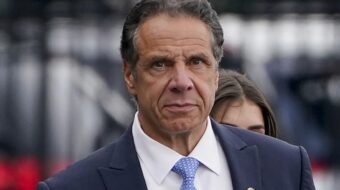A growing tide of support for Barack Obama, including endorsements by several prominent Republicans, is helping propel a potential “sweep” for Democrats in the House and Senate. Most notable was this month’s endorsement by Colin Powell, who cited “the vitriol and bigotry and prejudice” of the McCain-Palin campaign.
Activists are working for a landslide that would produce a bigger majority for Democrats in the House and reach the 60-vote threshold needed to end Republican filibusters in the Senate. These results, along with a presidential win, are key in order to shape policy post-election.
Now, in addition to the expected shift of open congressional seats, additional long-time Republican incumbents are facing defeat.
Alaska’s senate race has surged to the top of possible Democratic upsets with the conviction of incumbent GOP Sen. Ted Stevens on seven felony charges Oct. 28. Despite Stevens’ appeal to Alaskans to stand with him, Anchorage Mayor Mark Begich looks poised to take the seat from the 84-year-old sitting senator.
In Minnesota’s 6th Congressional District Republican incumbent Michelle Bachmann set off a firestorm when she called for investigations of “anti-American” members of Congress. Within days, Bachmann’s Democratic opponent Elwyn Tinklenberg was catapulted to frontrunner status.
Distancing himself from Bachmann’s McCarthyite attack, Republican former Gov. Arne Carlson endorsed Obama, to the dismay of another embattled Republican incumbent in the state, Sen. Norm Coleman. He is losing ground to his Democratic challenger Al Franken, now running four points ahead.
Around the country, a quarter million union volunteers have been knocking on the doors of fellow union members since summer to guarantee the “60 pro-worker super-majority” in the Senate needed for battles in the next Congress to pass legislation for union rights, creation of green infrastructure jobs and universal health care.
In a desperate attempt to regain momentum and galvanize his base this week, John McCain began urging voters to choose him as a means of blocking action by a Democratic-led Congress.
Speaking in Cleveland Oct. 27, McCain called Obama, House Speaker Nancy Pelosi and Senate Majority Leader Harry Reid a “dangerous threesome,” claiming that they would “take your hard-earned money.”
But many voters are now aware that the Bush administration has taken over a trillion dollars of their money and spent it on the war in Iraq and tax cuts for the wealthy instead of needed health care, education and job creation programs. The biggest issue for voters is the economic crisis, for which they hold the Bush administration responsible.
At the same time, GOP surrogates are taking to the airwaves arguing that voting for incumbent Republicans would be good “checks and balances” to an Obama administration. However, others note that the concept of checks and balances actually refers to the differing roles of the three branches of government — executive, legislative and judicial (regardless of political party) — a concept violated by the Bush administration.
Republican Senate incumbents who may face defeat on Nov. 4 are John Sununu, being challenged by Jeanne Shaheen in New Hampshire; Gordon Smith, who is being challenged by Jeff Merkley in Oregon; Elizabeth Dole, being challenged by Kay Hagan in North Carolina; and Thad Cochran, being challenged by Erik Fleming in Mississippi.
The race is also tightening for Saxby Chambliss, facing a strong challenge by Jim Martin in Georgia, and Minority Leader Mitch McConnell, in a close race with Bruce Lunsford in Kentucky.
Republican-held seats of retiring senators in Colorado, Virginia and New Mexico are also expected to flip to Democrats.
A survey issued by Democracy Corps on Oct. 27 found that Democratic candidates for House and Senate are running with a strong lead in the 20 most vulnerable Republican-held seats, with a 50 to 44 advantage, and remain close in 33 additional districts.
By a 52-point majority, voters in these Republican districts say that “it is more urgent to change the direction of the country by voting to change who is president and ‘who represents us in Congress’ than it is to support a member of Congress who has done a good job.”
Two-thirds of the 29 open Republican seats in the House are considered vulnerable. Democrats have a strong lead in six of those seats, in Arizona, Illinois, New York, Ohio and Virginia. Another 13 districts are considered toss-ups, in Alabama, California, Louisiana, Maryland, Minnesota, Missouri, New Jersey, New York, New Mexico, Ohio and Wyoming.
Among the endangered House Republicans is Rep. Chris Shays (Conn.-4), the last standing Republican in the House of Representatives from New England. Democratic challenger Jim Himes, who was behind by 10 points several weeks ago, is now in a dead heat to win the seat. Shays has supported the Iraq war from the start as well as tax breaks for the super-rich. The district includes some of the wealthiest and poorest cities in the nation. Also on the newly endangered list is anti-immigrant Republican Brian Bilbray (Calif.-50).









